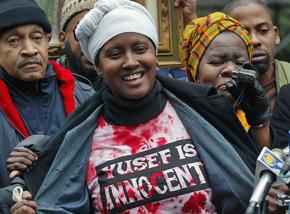Organizing for real justice in New York
reports on the efforts of New York City activists to fight wrongful incarceration--and looks at what it will take to dismantle the larger injustice system.
NEW YORK City activists fighting the criminal injustice system have come together to form the organization "Justice 4 the Wrongfully Incarcerated." Among other actions, the group is planning a statewide march from Harlem to Albany on May 8-16.
The organization was spearheaded by Sharonne Salaam, mother of Central Park Five exoneree Yusef Salaam. The group is fighting for substantial reform of the criminal injustice system in New York, and has added its qualified support to a bill currently before the New York legislature (S5875/A8157).
If passed, it would require videotaping of violent felony interrogations from start to finish. It would also require photo lineups to be "double-blind," meaning that officers assigned to a case don't know a suspect's identity or can't see which photo an eyewitness is viewing.
Ultimately, Justice 4 the Wrongfully Incarcerated believes accountability--that police officers must be criminally prosecuted, fired or otherwise disciplined for infractions--is the key to any such legislation. But under the current proposal, there is no accountability if any of the rules are violated.

The failure to videotape an interrogation wouldn't automatically result in a confession being suppressed--though it is considered as one potential factor. All police have to say is that the equipment either wasn't working or was "unavailable."
Moreover, there must be a finding that the failure to videotape was "intentional," not merely an accident or negligence for a confession to be suppressed. Similar weaknesses surround provisions about photo arrays and lineups. If an officer violates a particular rule, no punishment is given to the officer.
Justice 4 the Wrongfully Incarcerated is currently pushing for bills to be introduced that would allow for automatic compensation to the wrongfully incarcerated.
Many states have laws that provide automatic minimum levels of compensation to those exonerated after having been wrongfully incarcerated. For example, Texas gives minimum compensation to the wrongfully convicted of $80,000 per year of incarceration, and Mississippi gives $50,000 per year of incarceration. New York has no such law, and the process for exonerees to apply for any compensation at all is highly complicated.
Justice 4 the Wrongfully Incarcerated advocates for an automatic referral to a compensation board, and a minimum award of at least $1 million per year of wrongful incarceration to not only exonerees, but their families as well, which suffer right along with those wrongfully incarcerated. Ultimately, the group believes targeted communities of those wrongfully incarcerated should also receive compensation.
AS MICHELLE Alexander explains in her book The New Jim Crow, the system of mass incarceration developed during the 1970s and 1980s as a reaction to the social movements in the 1960's. Society failed to provide decent housing, jobs, schools and other resources to working class and poor people. Black and Brown lives didn't matter from the perspective of those in power.
The growth of mass incarceration started at the same time that the Nixon administration in the 1970s and Reagan administration in the 1980s were constructing the phantom "war on drugs," which eventually began the skyrocketing incarceration from 200,000 in the early '70s to over 2 million today. At the same time, the federal government was drastically cutting funding for mental health services, leading to the warehousing of people with mental health problems in prisons.
This was a bipartisan project. For most of the Reagan years, Democrats controlled at least one, if not both, houses of Congress.
It is not only the case that the criminal injustice system is a means of social control over the poor and working class, but it also serves as an excuse for the system failing to provide social services for all. As stated by Angela Davis her book Are Prisons Obsolete:
The prison therefore functions ideologically as an abstract site into which undesirables are deposited, relieving us of the responsibility of thinking about the real issues afflicting those communities from which prisoners are drawn in such disproportionate numbers. This is the ideological work that the prison performs--it relieves us of the responsibility of seriously engaging with the problems of our society, especially those produced by racism and, increasingly, global capitalism.
As Michelle Alexander notes, the U.S. imprisons a greater percentage of its Black population than South Africa did at the height of apartheid. And Angela writes notes that Blacks, Latinos and Native Americans are now more likely to go to prison than to go to college.
Our end goal as activists fighting the criminal system of injustice is, ultimately, the dismantling of the system of mass incarceration. Passage of S5875/A8157 would be just the opening for us. But we also recognize that the power structure will not willingly deconstruct a multibillion-dollar industry that serves its aims so well. As community rights activist Paul Cienfuegos has said, "It's not that this system is corrupt. It's that the system functions as it was designed to."
Our movement must incorporate civil disobedience and mass marches to wrest any major reforms away from the system. But we also recognize that, as Glenn Greenwald has said, "any institution that is built by human beings, no matter how formidable and powerful it may seem, can be undermined, or altered, or even replaced by other human beings."
Those motivated to dismantle the criminal system of injustice should join Justice 4 the Wrongfully Incarcerated and march from Harlem to Albany starting on May 8.


